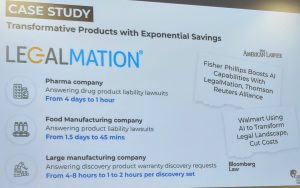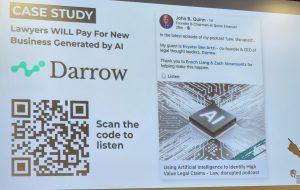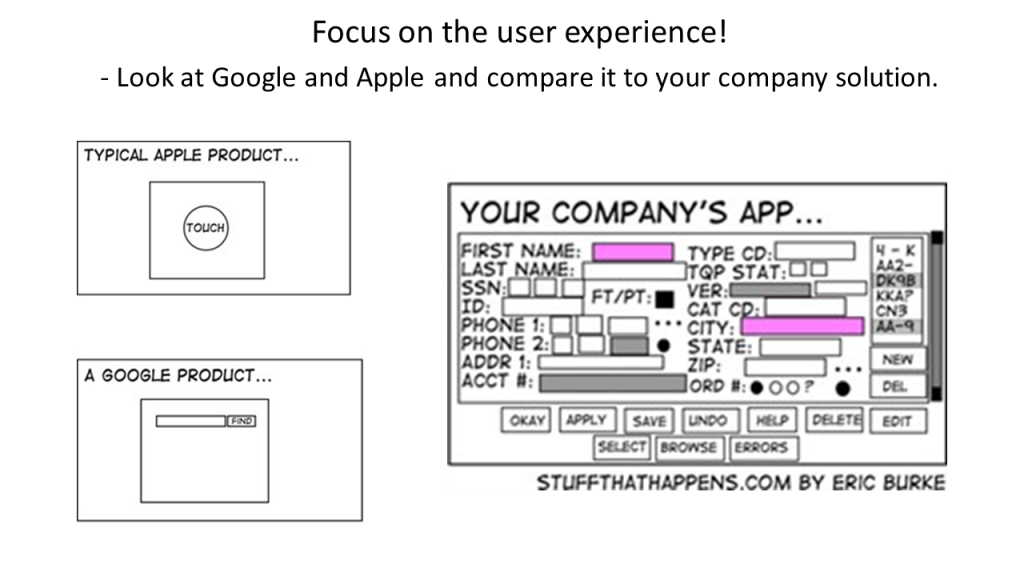After giving two reports from the Legal Innovators conference in UK, see day one and day two, this is a separate comment regarding the speech from Zach Abramowitz, founder of Killer Whale Strategies. He kicked off day one in an inspirational way about legal tech. He started out stating that efficiency is for amateurs. If you are working with legal tech, focus ought not to be on tools to make our work more efficient. Instead, we ought to develop tools that can support talent retention, assist the company in getting more business or give your company a competitive edge. That are the opportunities out there. That can disrupt the legal field.
An important point here is that disruptive technology does not mean that lawyers in general need to learn more about technology.
 One example presented by Zack was LegalMation, an AI solution that help litigation attorneys and other legal professionals by supporting them producing tailored documents to claims, allegations and requests with exponential savings in time. He mentioned an example with a Pharma company using this tool and therefore can answer drug product liability lawsuits in one hour, compared to how it previously could take four days. One description from LegalMation says the following:
One example presented by Zack was LegalMation, an AI solution that help litigation attorneys and other legal professionals by supporting them producing tailored documents to claims, allegations and requests with exponential savings in time. He mentioned an example with a Pharma company using this tool and therefore can answer drug product liability lawsuits in one hour, compared to how it previously could take four days. One description from LegalMation says the following:
“Unlike existing template generators, form-fillers, and ‘dumb’ tools, LegalMation’s ground-breaking AI system dynamically produces fully formatted responsive pleadings, discovery requests and responses and other documents, all tailored to the claims, allegations, and requests in the legal document uploaded, incorporating jurisdictional requirements as well as the attorney’s own style, and response strategy.”
This is a disruptive tool that is complex but easy to use for the lawyer. It has been developed with the lawyer in mind.
 Another example presented by Zack was Darrow. It is a sophisticated AI tool that identifies value legal claims. The idea is that lawyers will pay for receiving businesses this way, so it is a tool for generating new business.
Another example presented by Zack was Darrow. It is a sophisticated AI tool that identifies value legal claims. The idea is that lawyers will pay for receiving businesses this way, so it is a tool for generating new business.
This is also an example of an advanced AI tool that doesn’t require any AI understanding by the users of the tool. The complexity lies in the development of the tool. Lawyers using this tool to generate business do not need to know anything about AI.
Darrow scans publicly available data to detect hidden legal violations, turns them into cases, and gives you everything you need to know about them.
Many vendors seem to present their solutions to satisfy customers all need by saying it can do all the things asked for. And if you have a buyer of this solution without any experience of managing legal tech projects, this usually means a lot of problems. I would say that this is the reason why 77% of tech implementations fail. There is usually a long list of requirements from the buyers and the vendor wants to be helpful and develop this. In the end, it seems like every solution is developed like a Swiss army knife with a lot of functionality but no clear vision of the product and with most of the different functions that are not really “best in class”. The result of a combination of a Swiss army knife solution and buyers who wants it all, usually is a solution that is too complicated for the users. It is too difficult to understand and learn to use in the best way.
 In many cases, the analysis seems to be that lawyers need to learn more about tech. Instead, vendors ought to focus much more on well-developed plug and play solutions with a good user experience. This old illustration of the difference between the user experience in IT- solutions used within companies compared to Google or Apple solutions is still valid. Buyers of legal tech without sufficient knowledge in driving legal tech projects should not need to buy solutions that have all these different functionalities that will lead to a too complicated solution that users tend to avoid. Instead, we need much better solutions that are more plug and play. That should be the way forward.
In many cases, the analysis seems to be that lawyers need to learn more about tech. Instead, vendors ought to focus much more on well-developed plug and play solutions with a good user experience. This old illustration of the difference between the user experience in IT- solutions used within companies compared to Google or Apple solutions is still valid. Buyers of legal tech without sufficient knowledge in driving legal tech projects should not need to buy solutions that have all these different functionalities that will lead to a too complicated solution that users tend to avoid. Instead, we need much better solutions that are more plug and play. That should be the way forward.

